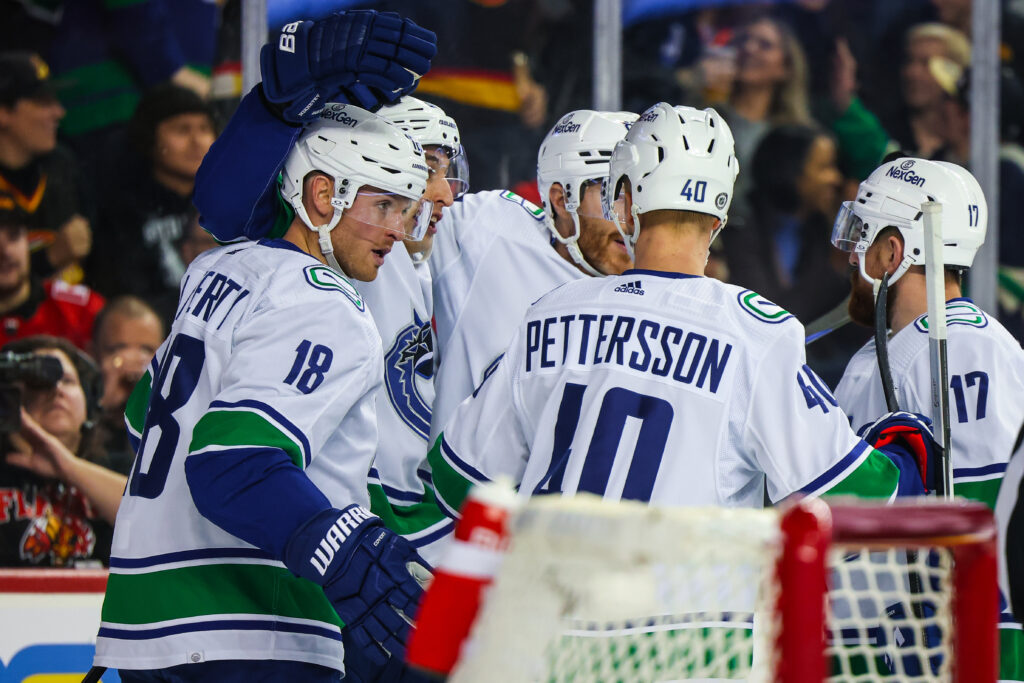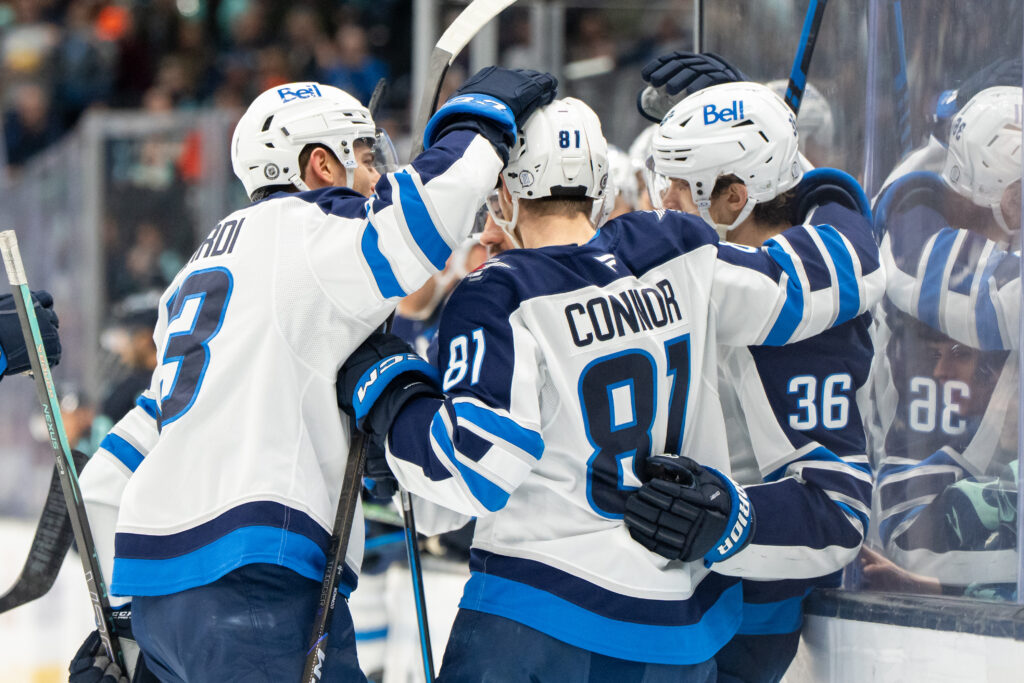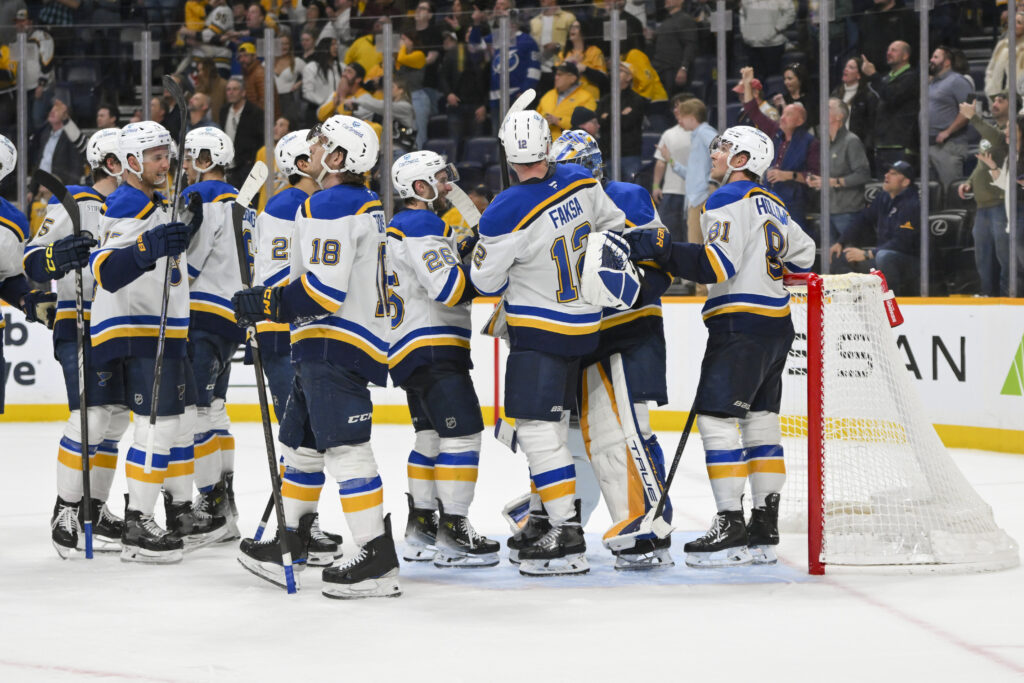With not even a quarter of the season behind us and considering the Vancouver Canucks‘ significant struggles in recent years, the question lingers: Can the Canucks truly be classified as contenders this season?
The resounding answer is yes, and here’s why.
Despite the season being in its early stages, the Canucks are already showcasing encouraging signs that distinguish them as bonafide contenders. As the season progresses, crucial factors have been instrumental in reshaping the team’s narrative.
The Vancouver Canucks: Contender or Pretender?
A String of Bad Luck
In recent seasons, the Canucks had record-breaking seasons for all the wrong reasons. Rewind to 2011, and Steven Stamkos held the NHL record for an unprecedented 0.21 crossbars per game, translating to a potential 17 additional goals if those shots had found the back of the net.
Fast forward to 2021, and Elias Pettersson shattered that record with an astonishing 0.36 posts per game, which would be an extra 30 goals over the course of an 82-game season. The Canucks weathered a storm of challenges, from unfortunate injuries to losing key players like Thatcher Demko for a significant portion of the previous season, resulting in the team relying on two AHL goalies.
Whether it was the blow to Pettersson’s confidence due to injury or the sheer string of misfortunes, the Canucks faced a seemingly unending streak of bad luck. In the previous season alone, they etched two more records into NHL history—firstly, the most blown multi-goal leads at the start of a season, ultimately leading to the second record of blowing the most multi-goal leads halfway through the season.
Hockey fortunes often hinge on unpredictable factors, especially in terms of puck luck and bounces. Vancouver has consistently found itself at the mercy of unfavorable circumstances in recent seasons. However, as fate would have it, the tides seem to be turning for the Canucks.
Like this:
Bounces going our way!
Puck off Lafferty's helmet and in 🚨 pic.twitter.com/zWcF5IH7et— Vancouver Canucks (@Canucks) November 1, 2023
And this.
Make that a 4️⃣ goal night for Brock Boeser 😱 pic.twitter.com/OCfxTxZhwc
— SportsCenter (@SportsCenter) October 12, 2023
This season, luck appears to be favoring the Canucks. A stark contrast to the previous season, Quinn Hughes, who endured a 29-game goal drought, has now seen half of his goals come from seemingly improbable bounces. And it’s not just Hughes getting lucky with bounces, it’s the entire team.
Stellar Goaltending
Carey Price set a new modern-day standard for goalies with his exceptional performance in the 2021 playoffs. In those playoffs, Price propelled the Montreal Canadiens, a team on the playoff cusp, to game five of the Stanley Cup Finals. His display highlighted how pivotal goaltenders are in a successful Cup run.
In the case of Vancouver, their goaltender, Thatcher Demko, emerges as a key figure. Despite enduring injuries for most of last season, Demko has regained his form. Currently boasting the sixteenth-best save percentage (0.917), the fifteenth-best goals-against average (2.46), the second-highest number of wins (12), and sharing the second-most shutouts (2).
While regular-season statistics provide a foundation, the true test for goaltenders often arises in the playoffs. Demko, however, has demonstrated a resistance to crumbling under postseason pressure. In the 2020 playoffs, he achieved a record-setting .985 save percentage and a minuscule 0.64 goals-against average, single-handedly carrying Vancouver to game 7 of the Semi-Finals, even when the Canucks’ overall team strength wasn’t even close to this season’s team.
Undoubtedly, possessing an elite starting goalie provides a substantial advantage, yet recent cup runs by the Vegas Golden Knights and the Colorado Avalanche challenge the notion of its absolute necessity. In those instances, goaltenders like Vegas’ Aiden Hill and Colorado’s Darcy Keumper performed admirably, but their roles were not the driving force behind their teams’ Stanley Cup triumphs. The Avalanche relied on potent offense, while Vegas achieved dominance through their depth.
How Do The Canucks Compare To Stanley Cup Champions?
The NHL is a copycat league, where teams meticulously analyze the blueprint of championship-winning squads and playoff triumphs to reimagine success within the framework of their existing rosters. Bearing this in mind, how does the composition of Vancouver’s roster stack up against some previous Stanley Cup champions?
A discernible trend becomes apparent when examining the last three Stanley Cup Champions. Each team had at least 11 players who scored ten goals, four 20-goal scorers, and, on average, one player who put up 30 goals, with Vegas being the exception, which once again highlights their depth. As it stands for Vancouver, based on the small sample size on hand, the Canucks are on pace for 13 ten-goal scorers, five 20-goal scorers, and four 30-goal scorers. This is just a projection, but it shouldn’t be too far off if things keep going as they are.
However, offensive depth alone doesn’t guarantee success, as evidenced by the three most recent Stanley Cup Champions, all of whom boasted high-caliber superstars. For Vegas, it was Jack Eichel; for Colorado, it was Nathan MacKinnon; and for the Lighting, it was Brayden Point and Nikita Kucherov. Vancouver also checks that box because, with Elias Pettersson ranking sixth in total league points at 34, he is showcasing a two-way Selke-caliber gameplay. Moreover, Pettersson has already demonstrated his clutch playoff prowess. He dominated the SHL Playoffs as a teenager, winning the Playoff MVP, and he showed up big time in his first and only run with the Canucks scoring 18 points in 17 games.
Adding J.T. Miller, a consistently underrated near-100-point player currently ranking second in the league with 39 points, further solidifies Vancouver’s offensive prowess, combining improved depth and high-end star power.
A Standout Defenseman Emerges
Moving to the defensive aspect, it’s widely acknowledged that defense wins championships. Regardless of a team’s offensive firepower, without a robust defense, they have no chance of winning. Not only is depth defensively important, but every title-contending team needs that bonafide superstar number-one defenseman. Quinn Hughes has emerged as Vancouver’s undisputed number-one defenseman, potentially contending for the Norris and even the Hart trophies if the season concluded today.
Hughes has revolutionized a sorry Canucks blueline due to his gifted skating and his ability to quarterback plays on any given shift. Though smaller in stature, Hughes compensates with remarkable skating and playmaking abilities. Concerns about his size are mitigated by his ability to disrupt plays through turnovers and strategic stickwork.
An ongoing comparison between Hughes and Cale Makar exists for valid reasons, given their shared status as dynamic puck-moving defensemen entering the league simultaneously. Fans and analysts tend to favor Makar as the superior defensive player, but it’s not necessarily true.
Upon examining both last season and the current one, Hughes emerges as the stronger performer in nearly every defensive analytic. Hughes leads in critical categories such as possession time, offensive zone possession time, shots created, and successful offensive zone passes. It’s noteworthy that Hughes often played alongside sixth and seventh defensemen leading up to this season, making his positive defensive contributions nothing short of remarkable.
While Hughes has benefited from playing alongside Filip Hronek, the Canucks’ overall defensive depth remains a concern. The additions of Hronek, Ian Cole, and Carson Soucy bolster the blue line, but the Canucks heavily rely on Demko’s performance to keep the puck out of the net. Strengthening the defensive lineup, particularly with a legitimate right-handed shot defenseman, would further enhance Vancouver’s roster. Notably, the Canucks have promising right-handed defenseman prospects in Tom Willander and Hunter Brzustewicz, suggesting future defensive fortification for the team.
The Rick Tocchet Effect
Prior to Rick Tocchet assuming the role of head coach, the Canucks engaged in high-event hockey consistently. While Bruce Boudreau played a crucial role in revitalizing Elias Pettersson, the defensive systems under his leadership were subpar. Although scoring is essential, the inability to prevent goals, particularly in the playoffs, diminishes its significance.
A coach’s most impactful quality is their understanding of the team’s dynamics. It involves implementing systems that ensure defensive success while fostering offensive strategies that create scoring opportunities. It’s an extremely delicate balance that can be challenging to achieve, which has contributed to the increased frequency of coach firings.
In Tocchet’s illustrious playing career, he embodied the essence of a true hockey player— a prolific scorer in critical games and a force with massive hits, relentless puck pursuit, and a physical presence. Importantly, he played alongside all-time greats, like Mario Lemieux, Jaromir Jagr, Bryan Trottier, and Wayne Gretzky. So Tocchet knows what it takes to win from a player’s perspective.
When a team experiences consistent lapses in focus, having a coach like Tocchet, an effective communicator who understands and motivates players and commands the respect of the locker room, it elicits a response from players who commit wholeheartedly to every shift.
For years, the Canucks fell short of their potential, but Tocchet’s presence last season brought undeniably transformative results. Under Boudreau, the team was struggling with an 8-15-2 record. Once they switched to Tocchet midseason, everything changed as the Canucks finished the remaining 57 games with a 32-15-10 record. Without Tocchet, Vancouver languishes as a bottom-tier team; with him, they are currently contending for a top-three position in the conference.
The addition of Adam Foote, notably effective on the penalty kill, has propelled the unit from the bottom ranks to a mid-tier position under his coaching. The involvement of Sergei Gonchar has significantly improved the Canucks’ powerplay, leading to a higher success rate.
The Rick Tocchet effect is evident in the entire roster, with players fully embracing the process. It seems he was the missing piece for this young Canucks roster, orchestrating a significant turnaround.
Contender or Pretender?
A prevalent source of frustration among Canucks fans stemmed from the team’s reluctance to fully embrace a comprehensive rebuild. While they secured notable draft picks, the consistent reliance on trades and free agency left them in a middle-ground position, not performing poorly enough for a top-three draft pick but also falling short of playoff contention.
Opting for a total rebuild tends to yield higher success rates, as top-three draft picks often introduce franchise-altering players. Beyond the initial trio of picks, there tends to be a substantial decline in talent.
Despite the Canucks’ failure to secure a top-three pick in the modern era, they managed to draft franchise-caliber players in crucial positions. Despite avoiding a complete rebuild, the team acquired key building blocks. The unnecessary acquisitions only prolonged the process, leading to a considerable delay, ultimately converging in the current season where the Canucks are poised to make the playoffs, equipped with a formidable team, adept coaching, and the determination to embark on a deep playoff run.
Should Demko replicate his performance from the 2021 playoffs, the Vancouver Canucks will emerge as legitimate contenders for the Stanley Cup. Looking ahead, gradual additions through the development of prospects within the system, coupled with strategic signings and trades, could propel the team to the next echelon, enabling them to compete against formidable opponents like Vegas and Colorado in a seven-game series.
Main Image: Sergei Belski-USA TODAY Sports



